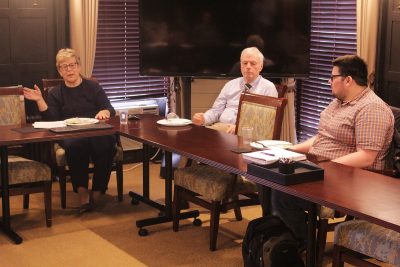
The Frederick S. Pardee School of Global Studies at Boston University hosted Mary Margaret Graham, who was the chief of the CIA office in New York City on Sept. 11, 2001, along with former CIA officer Joseph Wippl, who is also an international relations professor at BU, on Monday.
In a conference-style setting, Graham discussed the tragedy of 9/11, its effects and intelligence’s role in mediating and resolving the conflict, as well as shared her own experience working in the intelligence field.
Graham worked with the CIA for 29 years. From 1999 to 2001, she served as chief of the Directorate of Operation’s National Resources Division, and in 1998, she served as the deputy chief of the Directorate of Operations Europe Division. She was responsible for overseeing 16 agencies of the Intelligence Collection throughout her time and was the recipient of many highly respected medals honoring her dedication to intelligence.
Jennifer Kelley, a second-year graduate student in Pardee, attended the lecture. She said she was moved by Graham’s presentation.
“Graham did a very moving, detailed story about what happened on 9/11 and the months following it, and she gave some great insight into the challenges that the intelligence community faces in the future, mainly cyber security,” Kelley said.
Wippl said Graham “kept her cool” during the 9/11 attacks.
“She made sure that there was good coordination between the CIA and the FBI and the NYC police department,” Wippl said.
When fear, shock and disbelief are the expected reactions to the collapse of the World Trade Center on 9/11, Wippl said Graham approached the conflict with a collected mindset.
“She’s in a situation where she [saw] people who died in the attack, but she stayed focused on her job and the leadership she needed to provide on that day,” Wippl said. “By the time you get to a position like that, you know what leadership is like and you’ve been mentored on leadership. You’re working with very good people and you know how to react and what to do.”
Graham was working in an undercover CIA office that was located in one of the buildings at the World Trade Center. The day was another ordinary day of work, until she caught word of a hole in one of the towers without an explanation, only to be shortly followed by a second plane that flew into the other tower, Wippl said.
“By that time, it became clear that this was an act of terrorism,” Wippl said.
The morning of Sept. 11, 2001 changed how intelligence functions, and altered the mindset of the intelligence community. Wippl discussed how before 9/11, a wall existed between law enforcement and intelligence collection.
“You could not use information gathered from intelligence to use in a criminal case,” Wippl said. “After 9/11 that wall disappeared, the creation of the Directorate of National Intelligence to coordinate and exchange information in a way that had not taken place before 9/11.”
Now, the emphasis on intelligence and the amount of people involved are more prevalent than ever, “although a lot of that has been in the realm of covert action,” Wippl said.
The possibility of another event occurring on the same scale as the 9/11 terrorist attacks could exist in the future, but less likely in the United States as opposed to Europe, where weapons and explosives can be introduced much more easily, Wippl said.
“I believe that we cannot be 100 percent safe,” Wippl said. “I think we should not overreact, and that would be the really big tragedy of another 9/11.”
















































































































